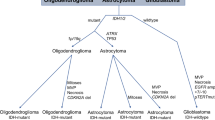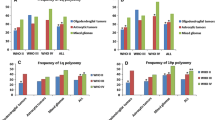Abstract
Malignant tumors intrinsically manifest genetic instability, and consequently genetic aberrations successively accumulate in tumor cells as the tumor progresses. However, the relationship of genetic instability and biological behavior still remains to be investigated in malignant tumors. In the present investigation, the relationship between chromosomal instability and patient prognosis was studied in 19 malignant gliomas. Chromosomal instability was estimated by numerical variation in chromosomes 7, 10 and 17 which was measured by fluorescence in situ hybridization (FISH), and DNA ploidy was determined by laser scanning cytometry. The mean number of fractions was significantly higher in cases with DNA aneuploidy than in those with DNA diploidy. The tendency toward higher fractions in glioblastomas existed, although it did not reach statistical significance. Kaplan–Meier survival rate analysis demonstrated significantly lower survival rates in patients with higher fractions of chromosome 7 (≥5) than others. Our results suggest that DNA aneuploidy in malignant gliomas reflects an underlying chromosomal instability, and that this instability is associated with clinical behavior.
Similar content being viewed by others
References
Giaretti W: Aneuploidy mechanisms in human colorectal preneoplastic lesions and Barrett's esophagus. Is there a role for K-ras and p53 mutations? Anal Cell Pathol 15: 99-117, 1997
Thibodeau SN, Bren G, Schaid D: Microsatellite instability in cancer of the proximal colon. Science 260: 816-819, 1993
Muleris M, Dutrillaux AM, Olschwang S, Salmon RJ, Dutrillaux B: Predominance of normal karyotype in colorectal tumors from hereditary non-polyposis colorectal cancer patients. Genes Chromosomes Cancer 14: 223-226, 1995
Lengauer C, Kinzler KW, Vogelstein B: Genetic instability in colorectal cancers. Nature 386: 623-627, 1997
Miyazaki M, Furuya T, Shiraki A, Sato T, Oga A, Sasaki K: The relationship of DNA ploidy to chromosomal instability in primary human colorectal cancers. Cancer Res 59: 5283-5295, 1999
Furuya T, Uchiyama T, Murakami T, Adachi A, Kawauchi S, Oga A, Hirano T, Sasaki K: Relationship between chromosomal instability and intratumoral regional DNA ploidy heterogeneity in primary gastric cancers. Clin Cancer Res 6: 2815-2820, 2000
Sasaki K, Kurose A, Miura Y, Sato T, Ikeda E: DNA ploidy analysis by laser scanning cytometry (LSC) in colorectal cancers and comparison with flowcytometry. Cytometry 23: 106-109, 1996
Kamenysky LA, Kamenysky LD: Microscope-based multiparameter laser scanning cytometer yielding data comparable to flow cytometry data. Cytometry 12: 381-387, 1991
Nishizaki T, Ozaki S, Harada K, Ito H, Arai H, Beppu T, Sasaki K: Investigation of genetic alterations associated with the grade of astrocytic tumor by comparative genomic hybridization. Genes Chromosomes Cancer 21: 340-346, 1998
Harada K, Nishizaki T, Ozaki S, Kubota H, Ito H, Sasaki K: Intratumoral cytogenetic heterogeneity detected by comparative genomic hybridization and laser scanning cytometry in human gliomas. Cancer Res 58: 4694-4700, 1998
Coons SW, Johnson PC: Regional heterogeneity in the DNA content of human gliomas. Cancer 72: 3052-3060, 1993
Schrock E, Thifl G, Lozanova T, du Manoir S, Meffert MC, Jauch A, Speicher MR, Nurnberg P, Vogel S, Janisch W, Donis-keller H, Ried T, Witkowski R, Cremer T: Comparative genomic hybridization of human malignant gliomas reveals multiple amplification sites and nonrandom chromosomal gains and losses. Am J Pathol 144: 1203-1218, 1994
Kim DH, Mohapatra G, Bollen A, Waldman FM, Feuerstein BG: Chromosomal abnormalities in glioblastoma multiforme tumors and glioma cell lines detected by comparative genomic hybridization. Int J Cancer 60: 812-819, 1995
Schlegel J, Scherthan H, Arens N, Stumm G, Kiessling M: Detection of complex genetic alterations in human glioblastoma multiforme using comparative genomic hybridization. J Neuropathol Exp Neurol 55: 81-87, 1996
Weber RG, Sommer C, Albert FK, Kiessling M, Cremer T: Clinically distinct subgroups of glioblastoma multiforme studied by comparative genomic hybridization. Lab Invest 74: 108-119, 1996
Fearon ER, Vogelstein B: A genetic model for colorectal tumorigenesis. Cell 61: 759-767, 1990
Dutrillaux B: Pathways of chromosome alteration in human epithelial cancers. Adv Cancer Res 67: 59-82, 1995
Author information
Authors and Affiliations
Rights and permissions
About this article
Cite this article
Nishizaki, T., Harada, K., Kubota, H. et al. Chromosome Instability in Malignant Astrocytic Tumors Detected by Fluorescence in situ Hybridization. J Neurooncol 56, 159–165 (2002). https://doi.org/10.1023/A:1014570720843
Issue Date:
DOI: https://doi.org/10.1023/A:1014570720843




